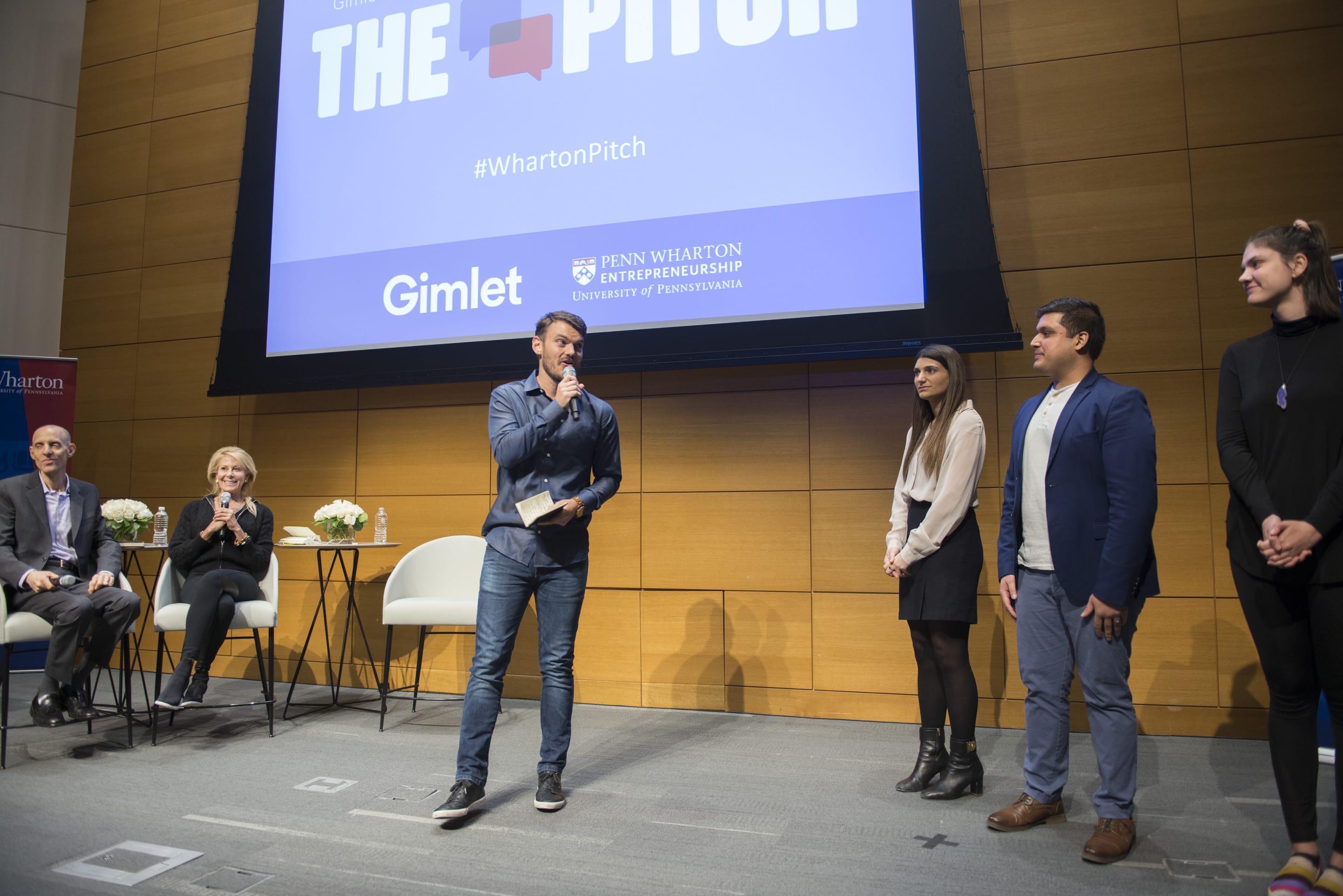“Do you know 1,000 people who will use the product?” asked Jillian Manus, one of the expert judges on the award-winning podcast, The Pitch. This seemingly simple question is one of the most important when evaluating early-stage startups, as she told a beyond-capacity crowd that was eager to see three young entrepreneurs compete for a coveted spot on an upcoming episode.
The atmosphere in Huntsman Hall’s Ambani Auditorium was electric for The Pitch’s first-ever on-the-road live show. Founded in 2015, Gimlet Media’s podcast allows early-stage startups to present their concepts to a panel of expert judges, and was recently named the best podcast on startup life by Forbes. The event, hosted by Penn Wharton Entrepreneurship on November 27, featured three Philadelphia-area entrepreneurs in a riveting showdown for who would ultimately get a chance to be on an official podcast of The Pitch in December. Series regulars Phil Nadel W88, founder and managing director of Forefront Ventures, and Manus, managing partner at Structure Capital, served as judges, with The Pitch executive producer and host Josh Muccio serving as emcee.
An introduction by Wharton management professor Ethan Mollick started the evening, with Mollick applauding the podcast for visiting campus and the city: “To have Philadelphia and Penn’s entrepreneurial spirit recognized by The Pitch at their first live show on-the-road is great.”

Judges Phil Nadel W88 and Jillian Manus
First up was Jessica Sarkisian, founder of Rezzio, an online career-planning website aimed at providing support to understaffed career services offices (the average among career services departments nationwide is one advisor for every 3,000 students, Sarkisian explained). Rezzio, which is already in beta mode on Drexel’s campus, aims to help students plan and implement a career roadmap starting in their freshman year. Tracking hard and soft skills—like when a student engages in a networking activity—quantifies a student’s overall progress, and results in an assessment of their preparation for the job market. Judge Phil Nadel asked, “Whose pain points are you solving, career services’ or the students?” Sarkisian responded, “Both.” She went on to explain that when integrated into career service departments, the software allows career advisors to access students accounts and provide personal advising more efficiently.
Next was Swirl, an app which founder and CEO Munir Pathak said aims to “connect you to people in your area with shared interests who are racially, ethnically, or culturally different from you.” By connecting co-workers who have common interests, the app hopes to create a more inclusive work environment, which in time will lead to more diverse, inclusive companies. Pathak responded to Nadel’s concern that the interaction would appear “forced” by explaining his plan to run the app through the popular corporate communication device, Slack. “It’s not a cold introduction,” Pathak explained, adding that the app will match an employee with a fellow co-worker at customizable intervals (every week, two weeks, etc.). Manus and Nadel advised Pathak, Swirl’s lone founder, to find someone with complimentary skill sets to partner with him, as investors worry about companies that only have one founder.
Last, Strella Biotechnology, founded by Penn undergraduate Katherine Sizov C19, is optimizing the production facility technologies that sense ripeness in apples. Starting with the basic question, “How old do you think an apple in the grocery store is?” Sizov explained the inefficiency of ripeness sensors now, and how her company’s patented technology aims to fix this. Citing the current industry’s $1.2 billion product losses each year, Strella has already partnered with a few apple packing companies in Washington State to test the sensors. As each sensor is made by hand, the judges worried about how the product would scale and advised Sizov to look into manufacturers.

From left: Sizov C19, Nadel W88, Manus, Sarkisian, Pathak, and Muccio
While the judges deliberated, Muccio asked the crowd. “Does anyone have an elevator pitch they want to practice?” What followed were three 30-second pitches, the most notable being Melina Flabiano WG19, founder and CEO of Keaton, a woman’s work wear line. Focusing on comfortable, modern designs that utilize the home try-on model, Keaton aims to make shopping for work clothes both fun and convenient.
In closing comments to each contender, Nadel reminded Swirl and Strella of the importance of finding a complimentary co-founder. To Rezzio, the judges stressed the need for a deliverable, and that buyers won’t want to wait four years before seeing if Rezzio helped students find employment. Finally, a winner was announced—and on December 12, you can find out who made it to the podcast by visiting The Pitch’s website.
Editor’s note: To hear this live “Philly Pitch-off” and learn who was named the winning founder, click here for the new episode of The Pitch.

























